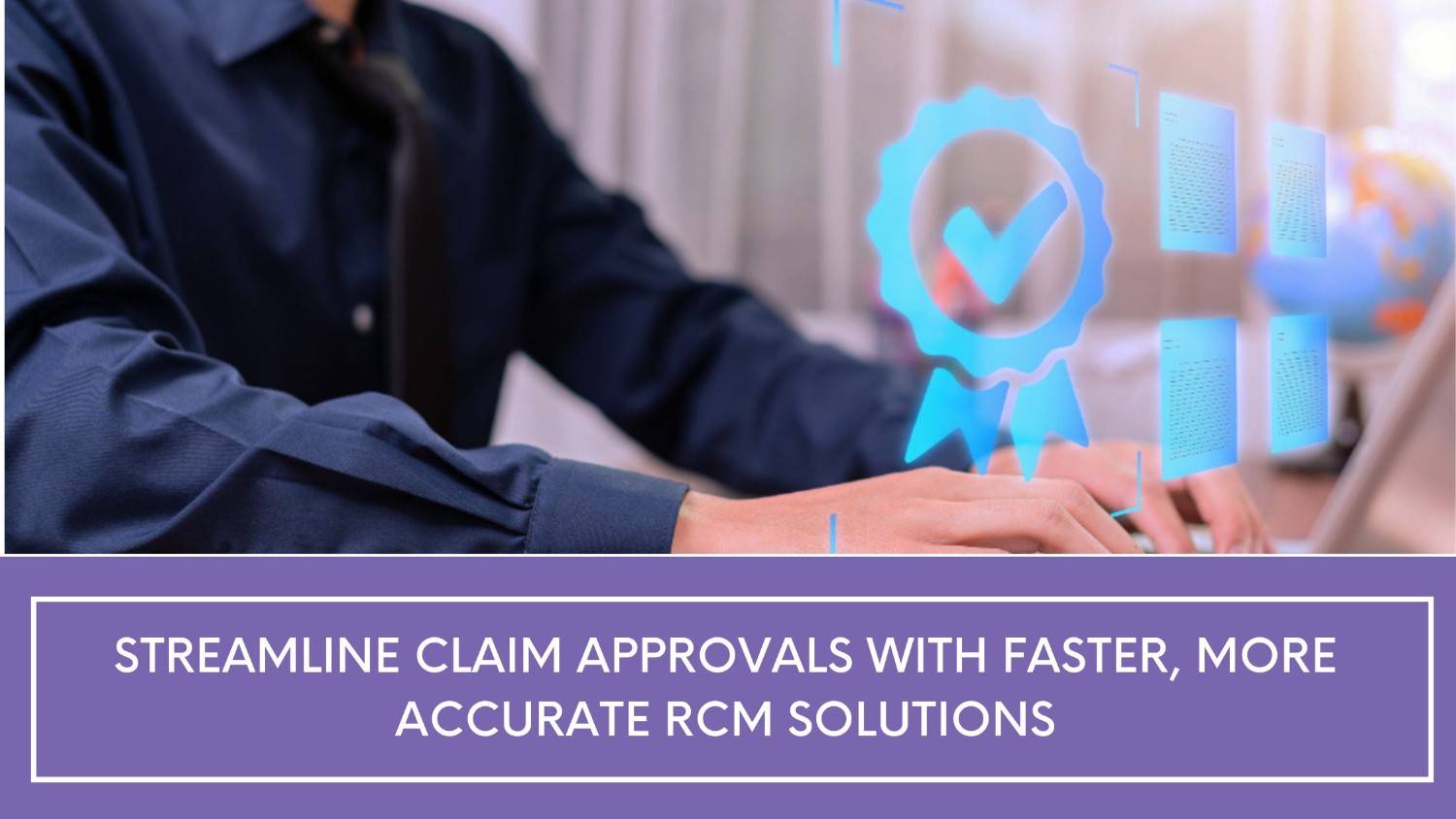Streamline Claim Approvals with Faster, More Accurate RCM Solutions
Streamline claim approvals with faster, more accurate rcm solutions is a significant concern for healthcare RCM solutions for providers in the healthcare sector. High claim approval rates are crucial for sustaining a steady cash stream and financial security. When claims are rejected or denied, it disrupts revenue flow. It adds administrative burdens to the medical billing department, making it more difficult for physicians to concentrate solely on patient care.
Common problems such as inaccurate coding, insufficient documentation, and late submission frequently result in claims being denied. What if there was a way to increase approval rates drastically? That’s where RCM- Revenue Cycle Management steps in.
Table of Contents
1. Why is RCM Important to Your Clinic’s Success?
RCM- Revenue Cycle Management is the foundation of a clinic’s financial success. It controls every stage of the medical billing procedure, from the initial patient interaction to the final reimbursement. By concentrating on optimizing these procedures, clinics can guarantee that claims are filed correctly and on time, resulting in smoother compensation.
Effective RCM boosts financial performance and saves administrative and operational expenses. Streamline claim approvals with faster, more accurate rcm solution Clinics with robust RCM systems have fewer rejections, more excellent claim approval rates, and more efficient billing procedures. Adopting proactive RCM solutions enables medical facilities to zero in more on treating patients while keeping their financial operations on track.
2. Understanding Proactive Revenue Cycle Management
Implementing a proactive approach to handling the revenue cycle entails predicting and tackling potential difficulties before they arise. Instead of responding to denials or problems, you build systems that prevent them from occurring in the first place.
Why Does It Matter?
By concentrating on prevention, such as extensive pre-claim checks and streamlining procedures, your medical facility can reduce denials, accelerate reimbursement timelines, and ensure consistent cash flow. It also improves billing precision and effectiveness, simplifying work for your employees and providing greater patient satisfaction. Proactive RCM is more than a strategy; it is the path to more efficient operations and healthier finances.
Proactive Revenue Cycle Management Process
Below is a flowchart that shows how proactive RCM works:
|
Step |
Action |
|
Patient Pre-registration |
Verify insurance eligibility and patient details |
|
Accurate Coding |
Ensure correct codes are used (ICD-10, CPT, etc.) |
|
Claim Scrubbing |
Use automation tools for error detection |
|
Claim Submission |
Submit claims with confidence |
|
Denial Management |
Quickly address any denials and refine processes |
|
Continuous Monitoring |
Leverage data analytics for ongoing improvements |
3. Strategies for Improving Claim Approval Rates
1. Thorough Patient Pre-Registration and Verification
One of the easiest and most successful strategies to avoid denials is to check the patient’s eligibility and coverage with insurance before offering treatments. Streamline claim approvals with faster, more accurate rcm solutions Healthcare practitioners can minimize errors and delays if they verify this data beforehand. Furthermore, guaranteeing that patient demographics are correct, including residences, insurance coverage, and primary healthcare provider information, ensures that claim processing runs smoothly in the future.
2. Correct and detailed documentation
Accurate and precise documentation plays a crucial role in minimizing denials. This involves proper coding methods, such as using ICD-10, CPT, and HCPCS codes properly. Using technology can also help identify document flaws, allowing personnel to spot problems before they become expensive errors. Medical professionals can improve their chances of earning full compensation by guaranteeing their documentation is detailed and correct.
3. Real-Time Claims Scrubbing
A crucial part of proactive RCM is claims scrubbing — reviewing claims for errors before submission. Real-time claims scrubbing uses automated tools to catch errors such as incorrect coding, missing information, and format issues. Automated systems also help ensure that claims align with the latest payer requirements, reducing the chances of rejections.
4. Effective Denial Management
When denials occur, an effective denial management strategy is essential. This means identifying the root causes of denials, whether they stem from coding errors, insurance issues, or other sources. By understanding denial trends and taking corrective actions, practices can address issues at the source and prevent them from recurring.
5. Leveraging Data Analytics and Reporting
Data analytics is vital for optimizing the revenue cycle. Tracking KPIs- key performance indicators such as rejection rates, resolution timeframes, and claim approval rates can provide practices with important insights into their RCM productivity. Using this data, practices can continuously improve processes and boost claim approval rates.
4. Technology’s Role in Proactive RCM
1. Automation in Claim Management
Automation plays a central role in proactive RCM. Accessibility verification and coding assistance tools can reduce human error and speed up processes. AI-driven technologies can streamline claims processing, ensuring accurate and fast claim submissions.
2. Cloud-based RCM Solutions
Cloud-based RCM systems provide real-time data access and seamless integration, which is essential for complying with current regulation requirements. These platforms can scale with your medical facility, adapting to changing payer needs and growing claim volumes.
5 . Challenges and Considerations
Though proactive RCM strategies can significantly improve claim approval rates, there are challenges in implementing these changes. Resistance to change within staff, the initial investment in technology, and the ongoing training required to stay up-to-date with evolving payer requirements can be hurdles to overcome. However, the benefits far outweigh these challenges, particularly regarding long-term sustainability and growth.
Proactive RCM techniques are crucial for improving claim approval rates and optimizing healthcare revenue cycle management services. By implementing pre-registration verification, accurate documentation, and real-time claims scrubbing, healthcare providers can reduce denials, improve billing accuracy, and ensure smoother financial operations.
With the right RCM technology, practices can stay ahead of the curve, enhancing overall financial health. As healthcare providers increasingly outsource RCM, partnering with experts like Practolytics offers a significant advantage. Practolytics brings advanced solutions, deep industry knowledge, and dedicated support to streamline your revenue cycle, reduce administrative burdens, and ensure better financial outcomes for your practice.
ALSO READ – Essential Tips for Error-Free Orthopedic Billing and Coding: Boost Your Practice’s Financial Health
Talk to Medical Billing Expert Today — Get a Free Demo Now!






